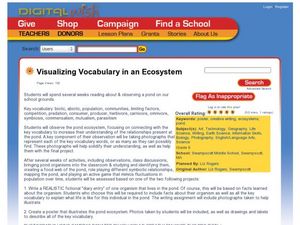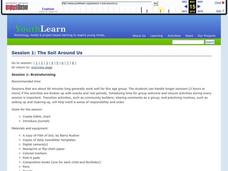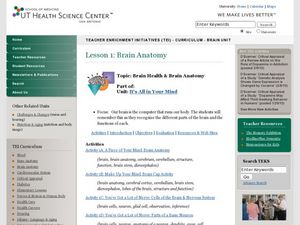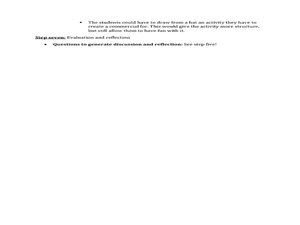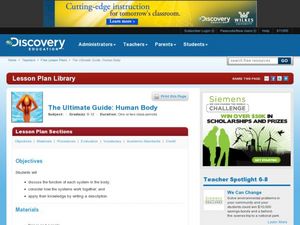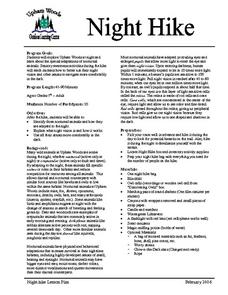Curated OER
Bats
Young scholars examine the migration patterns of the long-nosed bat. They identify threats to the animal and the plants bats help pollinate. They participate in a game to help them with the information.
Curated OER
Website Scavenger Hunt
Students use the internet to complete a species scavenger hunt. In groups, they answer questions given to them about sea lions, rockfish and killer whales. As a class, they identify any questions they have and discuss the role...
Curated OER
Floristic Relay
Fifth graders identify the role succession plays in the adaptation of our environment. Students identify pioneer and climax species and order habitats in succession. They recognize that different characteristics of species make them...
Curated OER
Video Umpires
Pupils play umpire in a baseball game. They video the umpire's calls and then examine the accuracy of a "line call" when compared to a taped record of a ball's exact impact location. They create a transcript of a fictional court case...
Curated OER
Poisoning the Prairie
Seventh graders investigate what pesticides are and why people use them. They examine the effect of pesticides on prairie grasses and what alternatives can be used.
Captain Planet Foundation
Which Plant Is Which?
Learn about dichotomous keys, plant identification, and how to care for the planet with a lesson that includes several hands-on and innovative activities. Kids go on a plant scavenger hunt and classify the plants that they find...
Curated OER
Wetland Food Webs
Students study life science. In this food webs and food chains comparison lesson, students examine the wetlands to discover the relationships that exist between the animals that live there. They participate in group activities and...
Curated OER
Visualizing Vocabulary in an Ecosystem
Sixth graders observe the pond ecosystem. In this ecosystem lesson plan, 6th graders observe the organisms at the pond and create a poster that illustrates the pond.
Curated OER
Current Sources of Energy to Maintain a Sustainable Future
In small groups, fourth graders identify different sources of renewable and non-renewable energy. They research the pros and cons of using each of these resources. They rank household appliances according to energy usage and efficiency....
Curated OER
"The Soil Around Us" Project
Young geographers collect samples of different kinds of soil to match to the soil terms in Barry Rudner's rhyming book Filet of Soil: dirt, mud, dust, soot, etc. They start a glossary for the project on index cards or large sheets of...
NOAA
The Biogeochemical Cycle
The biogeochemical cycle ... no physics? The fourth installment of a 23-part NOAA Enrichment in Marine sciences and Oceanography (NEMO) program introduces the biogeochemical cycle by having pupils simulate movement between Earth's...
Curated OER
RISE AND REVIEW
Students work in small groups to brainstorm responses to teacher posed questions as a means of review and present their Interview Projects. They present certain inventions, inventors, and scientific discoveries.
Curated OER
Brain Anatomy
Students explore the brain. In this brain anatomy activity, students explore the brain, identify the parts and neurons. They identify nerve pathways involved in daily activities.
Curated OER
Striking a Balance
Students participate in an activity that demonstrates the principles and dynamics of food chains. They discover that the sun's energy is captured by individual plants and transferred to animals.
Curated OER
Bat and Moth
Students stand in a circle, with two in the center. The center students are the bat and moth. They are both blindfolded, and the bat must catch the moth. The bat shakes a can, and the moth must reply by shaking his/her can, also. After...
Curated OER
What Can Data Tell Us?
Students analyze data they have collected themselves and by their classmates. In groups, they create data distributions to identify the highest, lowest and middle values. As a class, they discuss the concept of sample size and how it can...
Curated OER
Ben Franklin's Inventions
Students discover the life of Benjamin Franklin by studying his inventions. In this biography lesson, students identify the inventions of Benjamin Franklin and their impact on society today. Students create a commercial in an attempt...
Curated OER
Striking a Balance
Students simulate animals in a food chain. In this food chain lesson plan, students are identified as grasshoppers, frogs or hawks. Popcorn is spread across a lawn and students are given baggies (stomachs) and colored sashes to identify...
Curated OER
World Without Oil
Students discover the world of fossil fuels and oil shortages. In this world economy lesson, students read articles on the Internet discussing the world's dependence on oil and the possibility of an extended oil shortage. Students...
Curated OER
Nature's Recycling Program
Students identify what materials make up compost. In this science of recycling lesson, students explain the benefits of composting determine how compost is a good plant fertilizer.
Curated OER
Waterdrops
In this science worksheet, students learn about water cycle, weather, clouds, storms and water resources by completing 8 pages of this full color newsletter. Students read a story, study weather maps, learn to make a rain gauge, learn...
Curated OER
The Ultimate Guide: Human Body
Students study the body systems and their functions. In this human body lesson students research the Internet on body systems and write a description of them.
Curated OER
Scales, Scutes, and Skins
Young scholars identify the various adaptations of reptiles and amphibians. After distinguishing between reptiles and amphibians, students discuss the ways in which their adaptations aid in their survival. They participate in a hands on...
Curated OER
Night Hike
Learners explore Upham Woods at night and investigate about the special adaptations of nocturnal animals. They identify three nocturnal animals and how they are adapted to the night. Students explain what night vision is and how it works.









